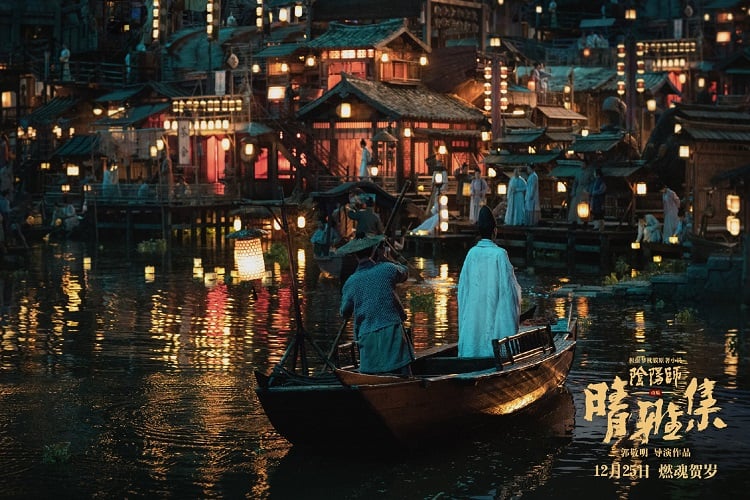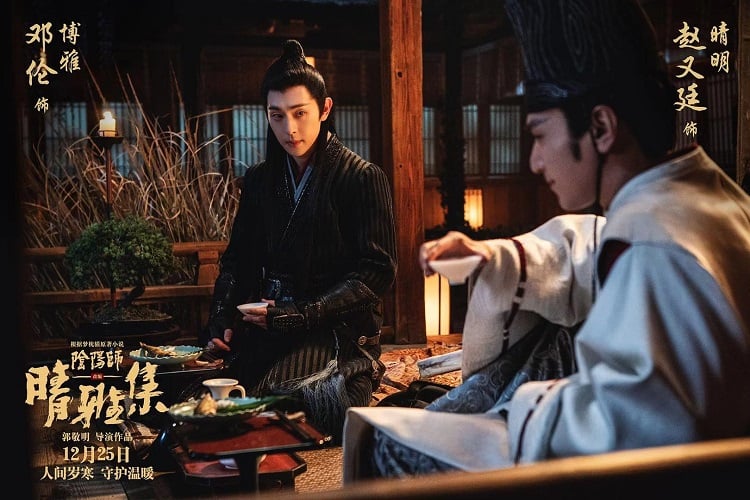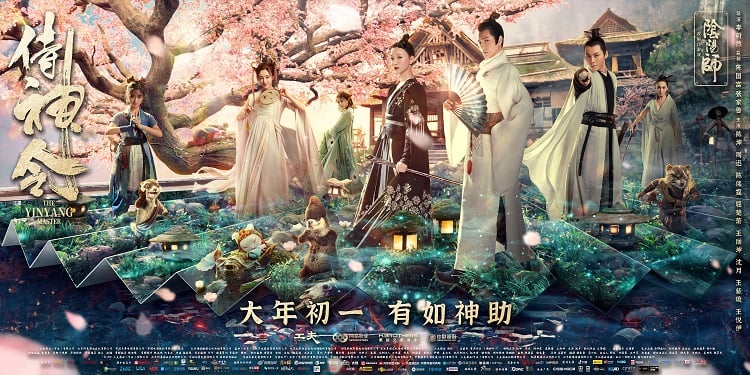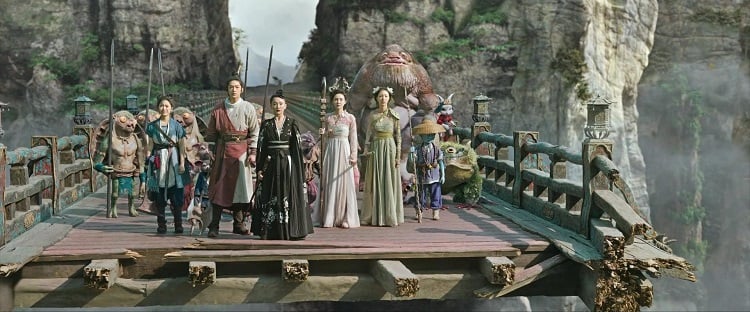Subtext | The Curious Case Of The Two Yin Yang Masters
Netflix users at the beginning of 2021 were justifiably confused when they noticed two new movies, both Chinese fantasy films, and both with almost identical names. One was The Yin Yang Master, while the other was The Yin-Yang Master: Dream Of Eternity. On watching, they discovered completely different stories, but in similar settings. Both had dual protagonists, and both pairs of protagonists were named Boya and Qing Ming, but played by different actors. So what was the link between these two films?
The answer is that both are based on a famous Japanese fantasy series: Onmy?ji, by Baku Yumemakaru. Though little known in the English-speaking world, Yumemakaru is immensely popular in Japan. Over a fifty-year career he has written more than 280 books that have sold a combined twenty million plus copies. His real name is Yoneyama Mineo, and nowadays his books are often listed under that rather than his pseudonym. Despite his fame, only eight of his books are currently available in English: three of the 20 entries in his Psyche Diver series, and a five-volume manga story called Summit of the Gods, about a doomed 1920s expedition to climb Mount Everest.
There are fifteen books in the Onmy?ji series, with the first published in 1988 and the most recent in 2021. It really began a little earlier than that, though. Much like Andrzej Sapkowski’s Witcher, Onmy?ji began life in short story form. The first story (called “Gensh? to ifu Biwa-ki no tame ni toraruru koto”, or “The Lute Called Gensh? Stolen by a Demon”) came out in 1986. The stories are based on the legend of Abe no Seimei, an actual historical figure in Japanese history who was the court magician and astrologer to various rulers of the Heian period (around 1000 CE). Back in those days this was an official position, titled “onmy?ji” (literally, “master of yin and yang”, meaning someone capable of controlling magical energy). After his death, Seimei became a folk hero sometimes described as “the Japanese equivalent of Merlin”. And just like Merlin, he appears in fantasy novels, movies and videogames to this day. The series has inspired multiple manga adaptations, two TV shows, a videogame (more about that later) and four films. The first of those films was released in Japan in 2001 with a sequel released in 2003. (Unfortunately these two films are very difficult to get hold of these days.) The other two are what we’re looking at today.

The Yin-Yang Master: Dream of Eternity (2020)
The first of the films released, Dream of Eternity, is directly based on the Onmy?ji series. Four master mages gather in the Imperial City to face the threatened return of an ancient snake demon. One of them is Qingming (Mark Chao, star of the Detective Dee series), a yin-yang master. (Incidentally, “Qingming” is simply the Chinese version of “Seimei”.) Qingming soon gets into a fight with one of the other masters, Boya (Allen Deng), who hates demons. Since Qingming’s mother was a fox demon, the two don’t get on. They’re forced to put their differences aside when one of the other mages is murdered and it becomes clear there is a conspiracy afoot to revive the demonic serpent.
Dream of Eternity is a high-budget production and it definitely feels like it. The cast and costuming are great, and while some of the special effects feel a bit too CGI (and, audiences noticed, a bit similar to Doctor Strange), others are extremely well done. The overall plot is good, and I did feel that Chao and Deng carried off Qingming and Boya’s “enemies to friends” arc fairly well. However the characterisation does feel a little abrupt and clumsy at times, while some of the performances go past formal and into stiff. The opening sequence is especially forced, though this does improve over the course of the film. The casting of Chao is a little unfortunate (though he is very good in the role), as it does invite comparison with Tsui Hark’s Detective Dee series and that’s a high bar to measure up to.

The film opened in China on December 25th 2020 and seemed to be both critically and commercially successful. However less than two weeks later, on the 4th January, Chinese authorities ordered cinemas to stop showing it. No reason was given, but it was probably targeted at the film’s director and screenwriter Guo Jingming. Guo is a celebrity in China, having risen to fame by winning literary prizes as a teen and then with his first young adult novel City of Fantasy. He released it in 2003 at the age of 20 and it was a massive bestseller. (A TV series based on City of Fantasy called Ice Fantasy used to be available on Netflix.) He invested the income from his novels in establishing his own publishing company, which was very successful.
In 2013 he moved into directing with the film Tiny Times, based off one of his own books (an “unironic tale of Shanghai’s vapid, wealthy youngsters”, as one critic put it). This led to him writing and directing three sequels, as well as several other movies. However his celebrity lifestyle and love of the limelight has occasionally led to scandal and controversy. The most persistent of these is the allegation that he plagiarised the plot of his second novel, something a court found him guilty of in 2006 and ordered him to pay compensation. Guo did, but he refused to publicly apologise and often claimed to be innocent. In December 2020 a public campaign dredging up the scandal forced him to finally apologise on New Year’s Eve, six days after Dream of Eternity released. It’s possible the Chinese government decided that he needed a public consequence so they closed his film.
The forced closure of the film didn’t put Netflix off buying the global rights to stream it, but it does seem to have put paid to a planned sequel which was apparently filmed at the same time as the first movie. Guo released the sequel to Tiny Times only months after the first movie, and he might have planned a similar stunt. Though there was an Onmy?ji movie in the cinema less than two months after his released, it was not his sequel. It was a film that had taken a much different path to the screen.

The Yin Yang Master (2021)
These films were not the first that China had seen of the Onmy?ji series. In fact the books were popular enough there to get a videogame adaptation in 2017. It went on to release in multiple other countries (including Korea and Japan). It was translated into English and released on mobile and Steam in the US and Europe in 2018. It’s a fairly standard live-service gacha game – the player controls various onnmy?ji (including Seimei himself) who summon shikigami to fight for them. Shikigami come from the same vein of Japanese folklore as onnmy?ji and are creatures created through magic by a yin-yang master. In the original novels they are also sometimes wild spirits who have contracted with a master, something the game and both films show. (The player spending in-game currency to summon a random slection of shikigami of various levels of rarity is where the gacha element comes in.)
This extra layer of abstraction lets the film play a little more fast and loose with its source material. This time Qing Ming (Chen Kun, of Flying Swords of Dragon Gate) is a former employee of the Yinyang Bureau who was expelled after being blamed for the death of a team guarding the Scale Stone, a dangerous artifact. He’s an easy target for blame, since he is half-demon. Yuan Boya returns, this time played by Qu Chuxiao and an imperial guard rather than a mage. Boya’s caravan transporting imperial tribute is attacked by yokai (spirit creatures), who turn out to be under Qing Ming’s protection. At the same time someone steals the Scale Stone, and the new head of the Yingyang Bureau Bai Ni (played by Zhou Xun, who was also in Flying Swords of Dragon Gate) suspects Qing Ming is behind it. Of course the truth is a lot more complicated than that.

The Yin Yang Master was originally filmed in 2018, but it still benefits from having a lot of art and design from the videogame to draw on. It also takes some of the game’s basic structure, but the main way it differs from the novels is by having the yokai and shinigami be much more a part of the world, and much less human in appearance. Dream of Eternity felt like a grounded world with magic behind the scenes (at least until the finale), while this film has more of a pure fantasy setting. The other major influence on the film, as is obvious from the casting, is classic wuxia. While Dream of Eternity feels very modern with a tense drama set in a court inspired by real Imperial politics, this feels like something that could have been made ten or even twenty years ago, if the technology had been there.
So how come both of these came out so close together? It’s hard to say. It’s likely that when they found out about each other neither wanted to be too late coming out to seem like a ripoff of the other. As to why they were both in production at the same time – well, the game made the novels very popular again, so both became prime licenses to grab. And which of these would I recommend you watch? Honestly, if you like martial arts fantasy films then watch both. Despite having the same inspiration, they tell very different stories and apart from the names (and Seimei’s half-demon background) they don’t overlap. But if you do want to pick one, then it’s down to personal taste. If you want a mystery plot and blockbuster visuals, then go for Dream of Eternity. If you want something that feels like an old-fashioned wuxia movie, then go for The Yin Yang Master. For me, I’m just going to hope that these films succeeding inspires people to bring more of Baku Yumemakaru’s work to the screen. It’s thanks to the success of The Witcher that we can read so much of Andrzej Sapkowski’s work in English, and it’s be great to see Yumemakaru follow a similar trajectory.
All images via IMDB.

